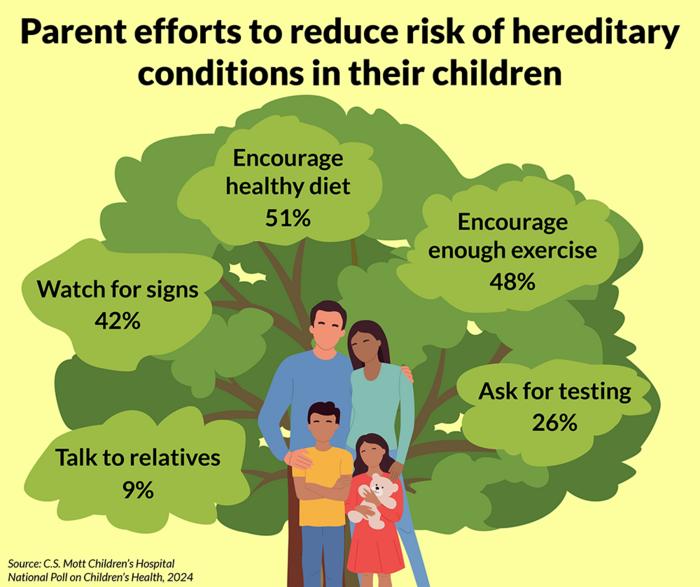ANN ARBOR, Mich. – Among things many families don’t wish to pass down to their children and grandchildren: medical issues.
ANN ARBOR, Mich. – Among things many families don’t wish to pass down to their children and grandchildren: medical issues.
One in five parents say their child has been diagnosed with a hereditary condition, while nearly half expressed concerns about their child potentially developing such a condition, a new national poll suggests.
And two thirds of parents want their healthcare provider to suggest ways to prevent their child from developing a health problem that runs in the family, according to the University of Michigan Health C.S. Mott Children’s Hospital National Poll on Children’s Health.
“This report reflects the need for parents to be equipped with accurate information about their family health history,” said Mott Poll co-director Sarah Clark, M.P.H.
“Parents play a key role in understanding and addressing their child’s health concerns, including those related to hereditary conditions.”
The nationally representative report is based on 2,057 responses of parents of children ages one to 18 years surveyed in February 2024.
Health history knowledge may help reduce risk
A quarter of parents say they have asked healthcare providers to test or examine their child for conditions based on their family history, and 7% say they sought genetic testing for their child.
Parents polled think family history puts their child at higher risk for allergies (41%), mental health conditions (33%), attention deficit/hyperactivity disorder (23%), obesity (22%), heart disease (20%), cancer (20%), alcoholism (18%), autoimmune conditions (13%), autism (6%), or other chronic conditions (29%).
But a quarter of parents think that they can prevent their child from developing a condition that runs in the family.
Family health history may help identify children with a higher-than-usual chance of having common medical disorders, such as heart disease, high blood pressure, stroke, certain cancers, obesity, and type 2 diabetes.
But these are complex disorders influenced by a combination of genetic factors, environmental conditions, and lifestyle choices, Clark says.
When parents have knowledge of their child’s family health history, she says, they can take steps to reduce their child’s risk, such as early screenings, genetic counseling, encouraging healthy eating and exercise habits, and being aware of possible signs and symptoms.
“Having a hereditary predisposition to an illness may prompt parents to be more careful with certain choices,” Clark said.
“A child’s pediatrician can be a resource to help optimize their health and avoid some of the illnesses experienced by their family members.”
Parents less confident about mental health history
Although many mental health conditions have a genetic component, parents polled feel slightly more knowledgeable about their child’s family health history for medical conditions than mental health.
Additionally, parents of older children report talking about family medical history more often than family mental health history with their child.
“Reluctance to openly discuss a family’s mental health history may reflect the stigma represented across generations and cultures,” Clark said.
“Parents can normalize discussions about mental health by integrating them into everyday conversations and encourage open and honest communication within the family about mental health.”
Empowering young people to take the lead
Many parents polled believe their child ages 12-18 could fill out a form about their family health history with their help.
As children near adulthood and get ready to move out on their own, Clark notes, it becomes more important for them to be knowledgeable about their family health history.
“Family history may be crucial for healthcare providers to make informed decisions about treatment options,” Clark said. “Encouraging adolescents to learn about their family health history early on can also empower them to take control of their health and make informed decisions throughout their lives.”





